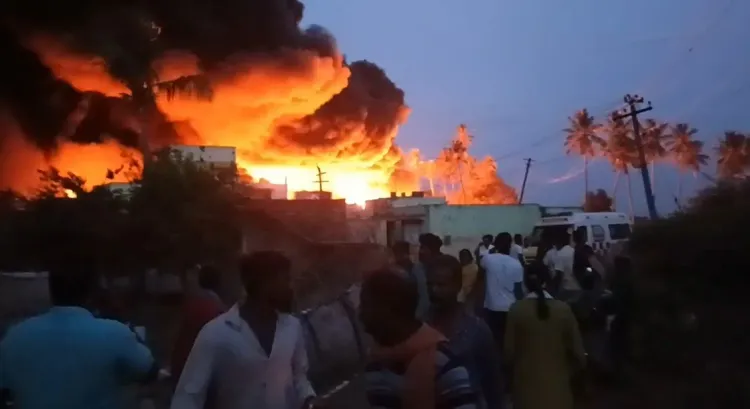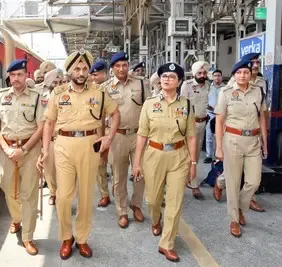What Caused the Major Fire on a Diesel-Laden Goods Train in TN?

Synopsis
Key Takeaways
- Fire erupted on a freight train near Tiruvallur, Chennai.
- Four wagons engulfed in flames.
- No injuries or fatalities reported.
- Rail services on the Chennai-Arakkonam route temporarily suspended.
- Investigation into the cause of the fire is ongoing.
Chennai, July 13 (NationPress) A significant fire erupted in the early hours of Sunday on a freight train near Tiruvallur along the bustling Chennai-Arakkonam line. The incident, which involved a diesel tanker coach, ignited around 5:50 a.m., consuming at least four wagons in fierce flames.
Witnesses on the scene reported a thick plume of black smoke billowing above the tracks.
Images and a video shared on social media depicted the burning train as emergency teams hurried to extinguish the flames.
Personnel from the railway and fire department promptly arrived at the location following the outbreak of the fire. Officials confirmed that there were no reported injuries or fatalities.
“Evacuations were executed, and containment efforts commenced immediately,” noted one emergency responder.
Given the substantial amount of flammable fuel on the freight train, authorities quickly enforced a temporary halt on all train operations on this segment of the Chennai-Arakkonam route. This precautionary action was taken to ensure that firefighting teams could safely put out the flames and prevent them from spreading to nearby structures.
Fire brigades and railway teams worked diligently to extinguish hotspots.
Railway officials stated that the suspension of rail services would remain in place as a safety measure, with technical teams evaluating the damage to the wagons and the integrity of the tracks.
“We are taking every precaution before resuming rail traffic,” commented a spokesperson from Southern Railway.
They also mentioned that temporary arrangements are being made for stranded passengers and affected freight consignments.
While the fire was contained to the goods train and did not directly impact passenger services, the emergency response and subsequent service suspension led to significant delays across the Chennai suburban rail network.
An official investigation has been initiated to ascertain the cause of the fire and evaluate any infrastructure damage. A senior railway official indicated that the findings will guide future safety and containment measures.
Rail services along the Chennai-Arakkonam corridor remain suspended while ongoing assessments are conducted. Authorities anticipate providing updates once the fire suppression and damage evaluations are completed.










